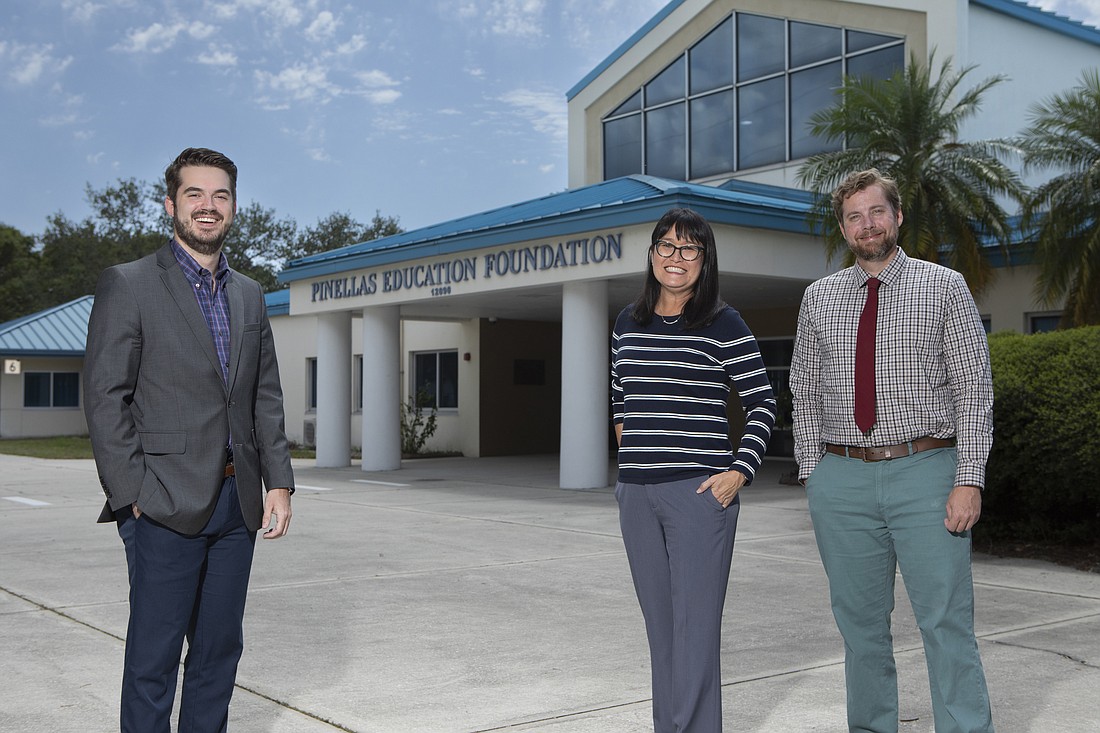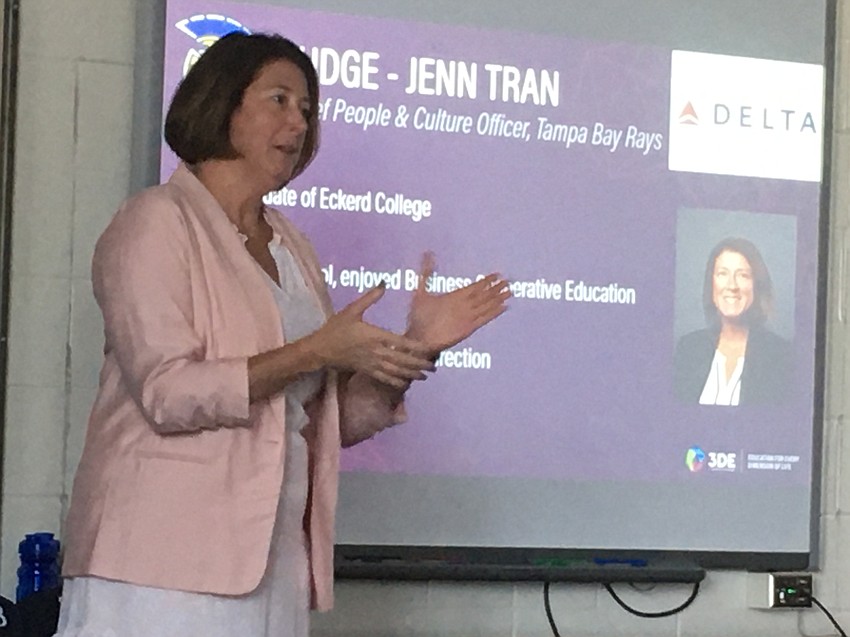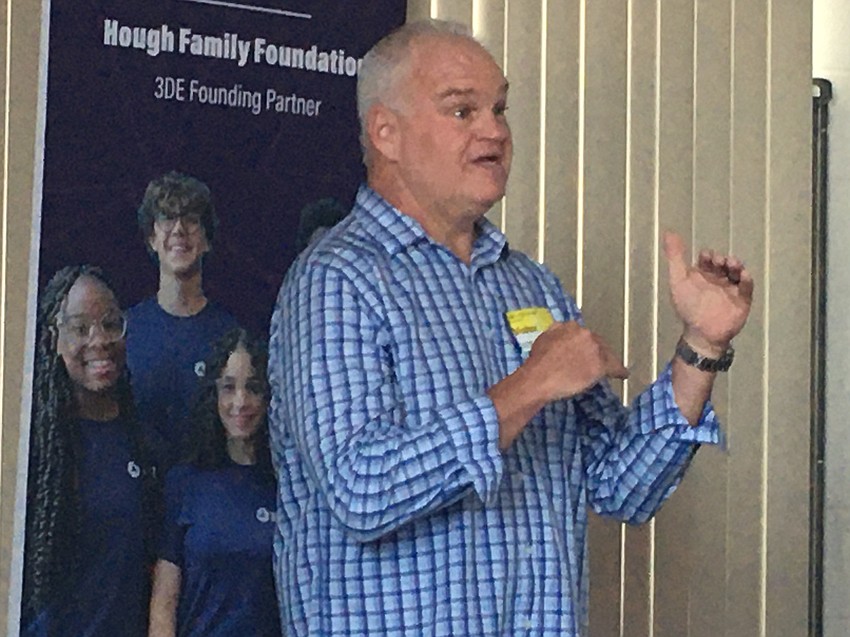- December 13, 2025
-
-
Loading

Loading

The affordable housing crisis plaguing Tampa Bay and other parts of the Gulf Coast has shown no sign of abating, and even though home sales are down 22% nationwide, prices continue to rise in many parts of Florida. According to March data from the Greater Tampa Realtors, the median sale price of a single-family home in the Tampa-St. Petersburg-Clearwater metro area has risen 1.3% since March 2022, to $395,000.
Such trends are vexing, to say the least, and there’s no magic wand, economically or politically, that can be waved to bring housing costs down.
Local educators, however, have risen to the challenge, heeding the call of experts such as J.P. DuBuque, who recently stepped down from his post as president and CEO of the St. Petersburg Economic Development Corp. In a recent interview with the Business Observer prior to his departure, DuBuque says “more wealth-building careers for residents” is a big part of the solution.
With that goal in mind, Junior Achievement of Tampa Bay has brought the 3DE education model to Pinellas County Schools, a school district that serves more than 104,000 students in 140 schools and education centers across the county. Originating at Banneker High School in Atlanta, part of the Fulton County School District, in 2015, the term “3DE” refers to the “three-dimensional relationship between the business community, Junior Achievement and our school districts,” says Olivier Millour, Junior Achievement of Tampa Bay’s manager of partnerships and development.
“Six core competencies” are at the heart of 3DE, Millour explains. “Things like collaboration, critical thinking, communication, self direction, cultural agility and creativity and innovation.”
Beginning in their freshman year, high school students who are part of the 3DE program take core classes such as science, English, math and social studies. But the curriculum is filtered through the lens of the six core competencies and taught by a 3DE-certified instructor. Simultaneously, they’re put in small groups and assigned a business case challenge they work on over a period of a few weeks. That project culminates in a pitch competition judged by a panel of experts culled from the business community.
“They’re put on a stage in front of CEOs and asked to present a business case challenge that they developed with their colleagues over five weeks,” Millour says. “They see tremendous value in that. At first they’re terrified, but they get through it and then they do it again and again and again.”
One of the most significant effects of the program, Millour adds, is students’ improved confidence and public-speaking skills. That’s an important outcome, because according to a July 2022 survey conducted by the Florida Chamber of Commerce, the state’s top five workforce needs are public speaking, communication, leadership, creativity and problem-solving. That poll also found that 81% of Florida businesses see a lack of “soft skills” among employees as a threat to their growth.
“Our vision is to systemically reengineer public high school education, to provide all students with economic opportunity,” Millour says. “That's done by driving student engagement, expanding economic opportunity and unlocking academic potential, mainly through making learning more relevant and being a bridge between the education system and our local business community who, from their perspective, are thrilled to have the opportunity to develop their future talent pipeline, because we know that workforce development is quite a key topic these days.”
The 3DE program has thus far been rolled out at Gibbs High School, St. Petersburg High School and Dunedin High School in Pinellas County; Hillsborough High School in Hillsborough County; and Tenoroc High School in Polk County. Millour says it will be implemented in the near future at Lakewood High School in St. Pete, as well as Jefferson High School and Howard W. Blake High School in Tampa.
The program has drawn the support of some of the largest and most influential companies in the Tampa Bay region, including ReliaQuest, Jabil, Power Design, Raymond James, Nielsen, Kforce, TECO Energy and Caspers Co., as well as national players such as Bank of America, USAA and PNC Bank. It also receives funding from nonprofits such as the Community Foundation of Tampa Bay and several family offices and foundations.
“They want to be able to support something like this, because they see it as an opportunity to transform communities,” Millour says. “A lot of our schools are typically schools where students don't always have the same opportunities as other schools — maybe they struggle academically or financially. We have tremendous support from individuals and family foundations that want to help bridge the gap in the communities that they're passionate about.”
In Pinellas County, the 3DE model has been enhanced by JA’s partnership with the Pinellas Education Foundation, which created a program called Next Generation Entrepreneurs. NGE had been an after-school program, but the JA-Pinellas Education Foundation team-up incorporated the initiative into schools during normal classroom hours, allowing more students, particularly those enrolled in 3DE, to participate.
“When we heard that 3DE was doing something as widespread as Next Generation Entrepreneurs, but during the school day, and capturing hundreds of students, we found that they would be a great partner for us,” says Pinellas Education Foundation CEO Stacy Baier. “You get a lot more students if you run it during the school day. It was a great marriage for us … now we have an opportunity to deepen the impact for students.”
NGE participants, Baier says, tackle a wide range of business challenges, including ones that affect their own schools. She cites a NGE project from a few years ago that concerned rising tardiness rates at Gibbs High School.
“When they explored why this was happening, what they found is that people were late because they were getting coffee,” Baier says. “So, the entrepreneurship group created an on-site coffee shop and they saw the truancy and tardiness rates go down significantly by just producing and providing really great coffee on campus.”
She adds, “They didn’t start in the lane of, ‘Oh, we need to make money.’ They started in the lane of, ‘Why are we having a tardiness problem? How can we solve this?’ And then a teacher worked with the students to formulate this idea.”
On April 26, a 3DE class made up Gibbs High School freshmen, split up into four teams, presented their recommendations for solving a business case challenge. The challenge was sponsored by Delta Airlines, which, plagued by consistently poor reviews, was looking for ways to improve the gate experiences of passengers. A panel of judges made up of Tampa Bay Rays executives — David Egles, executive director of the Rays Baseball Foundation; Jennifer Tran, chief people and culture officer; and Bill Wiener Jr., chief people and community officer — evaluated the four proposals.
“The Rays are very excited to be part of the judging experience of 3DE,” Tran says. “We are big supporters of Junior Achievement and believe in what they’re doing. It’s exciting to see the students and all of their hard work come to life.”

Also, according to Tran, 3DE students will soon be able to help the Rays address a business challenge. “We look forward to doing it again,” she says, “so much so that we're going to have a case study next year for the students to work on that’s Rays-related."
The teams’ proposals for Delta Airlines ranged from buying new seats for gate areas to having the airline merge its mobile app with Expedia’s. Another group suggested improving the mobile app so passengers could order food from restaurants in the terminal and have it delivered to their seats at the gate.
Gibbs High 3DE student Ryan Thornley, a member of the winning team, says he’s never so much as set foot in an airport, let alone flown on an airplane. So the project challenged him to think as creatively as he could.
“You have to think creatively a lot of the time,” he says, “especially during school, like when you’re doing a project.”
Thornley’s fellow student and teammate, Nola Mooney, seeks a career in either psychology or digital videography and visual effects, “but I think, just generally, having good presentation skills is an important part of any job.”

The student's experience will serve them well as they advance through the 3DE curriculum. In a couple of years, when they’re juniors, they might get the chance to participate in the Pinellas Education Foundation’s Next Generation Entrepreneurs Finale Competition, which was held two weeks earlier, on April 12. That event is more akin to a product pitch competition along the lines of “Shark Tank” and includes a $5,000 college scholarship for the winning team. About 100 students from St. Petersburg High School and Dunedin High School participated this year, Baier says, and each team was assigned a volunteer mentor from the local business community to whom they could turn for advice and suggestions.
“The scholarship money that we give at the end is fantastic,” Baier says. “But the part when you ask them, ‘What did you like most about this?’ They focus on the adult interaction with mentors who have been down this road."